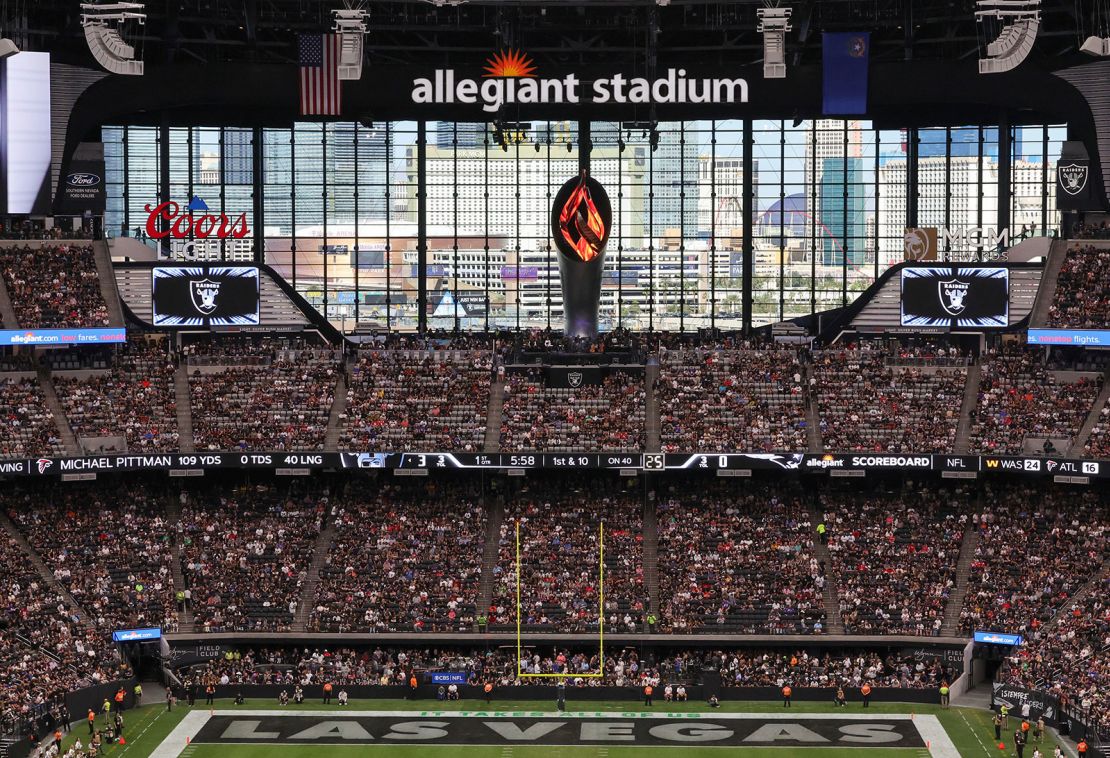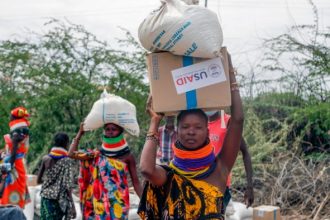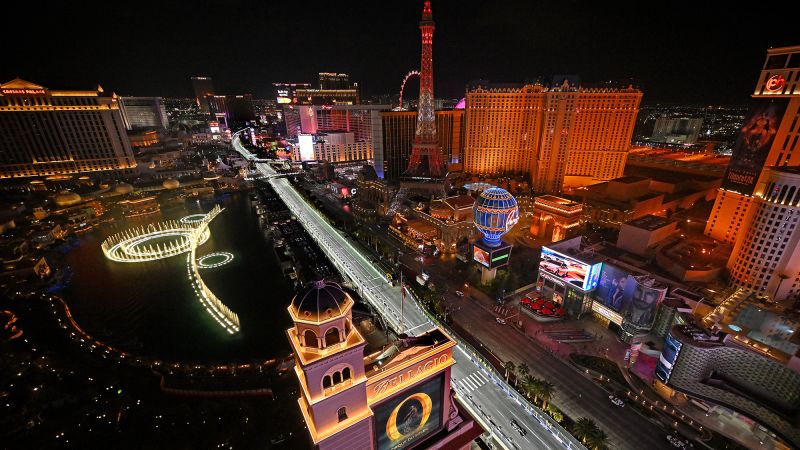When Formula 1 racecars rip along the iconic Las Vegas Strip this Sunday, it will serve as another highly visible reminder of a significant shift in the city’s economy.
In under a decade’s time, the desert city long known for its casinos, food and live entertainment has become the home to four major league sports teams (the latest being MLB’s Athletics), six minor league teams, a major sports organization in the Ultimate Fighting Champion, and four large sports venues playing host to events such as NCAA tournament games, NFL Pro Bowls, and, coming this February, Super Bowl LVIII.
At least a half-dozen more venues are in the planning stages, and the city appears poised to be one of the top picks for an NBA expansion team and an MLS team, as well.
“Ten years ago, leagues didn’t even want to look at us twice,” said Andrew Woods, director of the Center for Business and Economic Research at the University of Nevada, Las Vegas. “Now it feels like we’re the belle of the ball.”
Las Vegas a sports metropolis? It’s a potentially lucrative development that could spell expansion and a broader economic base for the city; however, it comes with growing pains.
The initial economic impact estimates for Sunday’s Formula 1 Las Vegas Grand Prix and the February 2024 Super Bowl were $1.3 billion, and $500 million, respectively. (But this was before ticket prices slid for F1 when the championship was won earlier in the season).
That total would match the estimated $1.8 billion contributed to the metro area by all sporting events from July 2021 to June 2022, according to an economic impact study released this summer by the Center for Business and Economic Research at UNLV’s Lee Business School.
With bigger events, however, come bigger challenges. Construction and preparation for the F1 race has gnarled traffic, agitating locals in the process. Also drawing the ire of longtime residents and visitors are the (initially) exorbitant prices and the potentially blocked views of everything from the Bellagio fountains to the Mirage volcano, due to the temporary grandstand and signage.
“There are questions about do we have adequate infrastructure that can handle bigger and bigger events,” Woods said. “How do we make this beneficial for both a community that could soon have 3 million residents and have 50 million visitors a year and make that work for everyone?”
And initially, it doesn’t appear that all are benefitting equally from the double-down on sports. In reviewing the intensity of sports in the Las Vegas area, Woods and his team noticed a troubling trend: “sports desserts.”
Some communities, especially those that have been underserved in the past, might not have the same access to parks, local sports businesses and facilities, they found. Woods said more research needs to be done to confirm the initial findings.
Sports have been deeply engrained in Las Vegas for decades, going back to the boxing heyday of the 1950s and 1960s and the rise of sports betting. Super Bowl Sundays and March Madness tournaments typically bring packed casinos and sportsbooks.
But for many decades, the NFL and other leagues opposed having sport franchises in Las Vegas, most likely due to the city’s deeply rooted gambling industry. At one point, the city couldn’t run a tourism ad during the Super Bowl.
By 2017, the sentiment had started to shift — including among league commissioners like the NFL’s Roger Goodell — as the National Hockey League as well as the Oakland Raiders had plans to set up shop there.
“I think society in general has a bit of a change with respect to gambling in general,” Goodell said during a March 2017 press conference. “Vegas is not the same city it was 10 or 20 years ago. It is a much more diverse city, it has become an entertainment mecca.”
He added: “They made a very compelling proposal, which the ownership obviously approved overwhelmingly.”
Then came the 2018 ruling from the Supreme Court striking down a federal law that prohibited commercial sports betting in most states.
As sports betting exploded into people’s living rooms, Vegas remained at the center of that digital industry — being home to the casino operators that backed those sportsbooks and online gambling companies such as FanDuel. The rise of sports betting and continued explosion in fantasy football created additional interest in sports and, in turn, back in Vegas, said Steve Hill, chief executive officer of the Las Vegas Convention and Visitors Authority.
“Vegas fans tend to be sports fans, too, and sports have helped us expand the customer base that are willing to consider Las Vegas,” Hill said.
Last year, 6% of surveyed visitors attended a sporting event, up from 3% in 2019, and 4% of visitors said sporting events were the primary reason for a Vegas trip, according to the LVCVA 2022 Las Vegas Visitor Profile Study.
“I think the city and our businesses are taking a big bet that both these percentages are going to grow,” said Woods of UNLV, “that we could see those percentages double in the near-term here, in the next two, three, four years as we add more sporting events.”
Weathering the highs and lows
The city that billed itself as the “Entertainment Capital of the World” has now rebranded as the “Sports and Entertainment Capital of the World.”
Sports are growing in Las Vegas, but leisure and hospitality remain the city’s bread and butter. In Clark County, Nevada, where Las Vegas is located, one in four workers are in the leisure and hospitality sector, and $1 for every $3 are generated by those businesses, Woods said.
And during the past two years, Las Vegas and other tourist-centric cities have benefitted from consumers’ post-pandemic splurges on experiences and travel versus goods. Nevada’s monthly gaming revenue this year outpaced pre-pandemic levels and notched a nominal record monthly high in July at $1.4 billion, according to Nevada Gaming Control Board data.
Having that deep concentration in one industry can be positive when times are good, but if there’s an economic downswing, it can be devastating for a local economy.
In April 2020, Covid-19 shutdowns resulted in unemployment spiking in Las Vegas to a startling 34%, as the metro area became the hardest-hit in the United States.
“The Strip was shut down, and that’s where revenue for services is generated and it’s where the livelihood of hundreds of thousands of people is generated, and it was awful and scary at the time,” Hill said.

As the pandemic wore on, construction continued on expanding the Las Vegas Convention Center as well as the Raiders’ Allegiant Stadium, among other projects.
“The city continued to bet on itself,” Hill said. “And that really paid off.”
Although the sports events industry is nested within the leisure and hospitality sector, there are some early indications that the investments could spur diversification of the regional economy, through the rise of ancillary businesses in areas such as services, marketing and medicine.
The number of businesses in sports instruction has seen a 156% increase in the past 10 years, according to UNLV’s research. And youth sports participation, especially among girls and young women, has seen marked increases, according to the report.
“Anytime you can broaden what drives the economy, it’s a stabilizing influence and maybe a growth influence, too,” Hill said. “When it comes to, particularly, team sports, it doesn’t matter what’s going on in the economy, you’re going to have those events, and it’s a reason for people to decide to come to Las Vegas.”
Read the full article here





